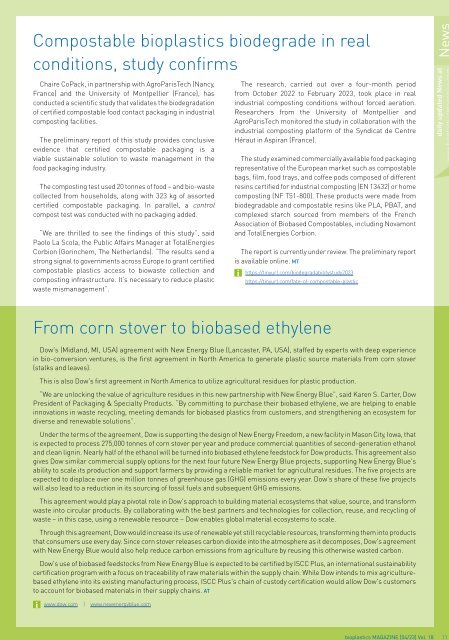Issue 04/2023
Highlights 100th issue Rebranding
Highlights
100th issue
Rebranding
Create successful ePaper yourself
Turn your PDF publications into a flip-book with our unique Google optimized e-Paper software.
ioplastics MAGAZINE [<strong>04</strong>/23] Vol. 18<br />
11<br />
Compostable bioplastics biodegrade in real<br />
conditions, study confirms<br />
Chaire CoPack, in partnership with AgroParisTech (Nancy,<br />
France) and the University of Montpellier (France), has<br />
conducted a scientific study that validates the biodegradation<br />
of certified compostable food contact packaging in industrial<br />
composting facilities.<br />
The preliminary report of this study provides conclusive<br />
evidence that certified compostable packaging is a<br />
viable sustainable solution to waste management in the<br />
food packaging industry.<br />
The composting test used 20 tonnes of food – and bio-waste<br />
collected from households, along with 323 kg of assorted<br />
certified compostable packaging. In parallel, a control<br />
compost test was conducted with no packaging added.<br />
“We are thrilled to see the findings of this study”, said<br />
Paolo La Scola, the Public Affairs Manager at TotalEnergies<br />
Corbion (Gorinchem, The Netherlands). “The results send a<br />
strong signal to governments across Europe to grant certified<br />
compostable plastics access to biowaste collection and<br />
composting infrastructure. It’s necessary to reduce plastic<br />
waste mismanagement”.<br />
The research, carried out over a four-month period<br />
from October 2022 to February <strong>2023</strong>, took place in real<br />
industrial composting conditions without forced aeration.<br />
Researchers from the University of Montpellier and<br />
AgroParisTech monitored the study in collaboration with the<br />
industrial composting platform of the Syndicat de Centre<br />
Héraut in Aspiran (France).<br />
The study examined commercially available food packaging<br />
representative of the European market such as compostable<br />
bags, film, food trays, and coffee pods composed of different<br />
resins certified for industrial composting (EN 13432) or home<br />
composting (NF T51-800). These products were made from<br />
biodegradable and compostable resins like PLA, PBAT, and<br />
complexed starch sourced from members of the French<br />
Association of Biobased Compostables, including Novamont<br />
and TotalEnergies Corbion.<br />
The report is currently under review. The preliminary report<br />
is available online. MT<br />
https://tinyurl.com/biodegradabilitystudy<strong>2023</strong><br />
https://tinyurl.com/fate-of-compostable-plastic<br />
daily updated News at<br />
From corn stover to biobased ethylene<br />
Dow's (Midland, MI, USA) agreement with New Energy Blue (Lancaster, PA, USA), staffed by experts with deep experience<br />
in bio-conversion ventures, is the first agreement in North America to generate plastic source materials from corn stover<br />
(stalks and leaves).<br />
This is also Dow's first agreement in North America to utilize agricultural residues for plastic production.<br />
“We are unlocking the value of agriculture residues in this new partnership with New Energy Blue”, said Karen S. Carter, Dow<br />
President of Packaging & Specialty Products. “By committing to purchase their biobased ethylene, we are helping to enable<br />
innovations in waste recycling, meeting demands for biobased plastics from customers, and strengthening an ecosystem for<br />
diverse and renewable solutions”.<br />
Under the terms of the agreement, Dow is supporting the design of New Energy Freedom, a new facility in Mason City, Iowa, that<br />
is expected to process 275,000 tonnes of corn stover per year and produce commercial quantities of second-generation ethanol<br />
and clean lignin. Nearly half of the ethanol will be turned into biobased ethylene feedstock for Dow products. This agreement also<br />
gives Dow similar commercial supply options for the next four future New Energy Blue projects, supporting New Energy Blue's<br />
ability to scale its production and support farmers by providing a reliable market for agricultural residues. The five projects are<br />
expected to displace over one million tonnes of greenhouse gas (GHG) emissions every year. Dow's share of these five projects<br />
will also lead to a reduction in its sourcing of fossil fuels and subsequent GHG emissions.<br />
This agreement would play a pivotal role in Dow's approach to building material ecosystems that value, source, and transform<br />
waste into circular products. By collaborating with the best partners and technologies for collection, reuse, and recycling of<br />
waste – in this case, using a renewable resource – Dow enables global material ecosystems to scale.<br />
Through this agreement, Dow would increase its use of renewable yet still recyclable resources, transforming them into products<br />
that consumers use every day. Since corn stover releases carbon dioxide into the atmosphere as it decomposes, Dow's agreement<br />
with New Energy Blue would also help reduce carbon emissions from agriculture by reusing this otherwise wasted carbon.<br />
Dow's use of biobased feedstocks from New Energy Blue is expected to be certified by ISCC Plus, an international sustainability<br />
certification program with a focus on traceability of raw materials within the supply chain. While Dow intends to mix agriculturebased<br />
ethylene into its existing manufacturing process, ISCC Plus's chain of custody certification would allow Dow's customers<br />
to account for biobased materials in their supply chains. AT<br />
www.dow.com | www.newenergyblue.com

















